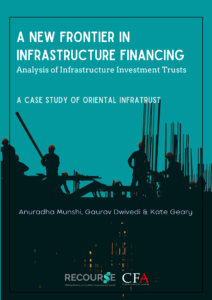A Case Study of Oriental InfraTrust
Research raises red flag over international financial support for risky new infrastructure finance model
 20 October 2022: Centre for Financial Accountability (CFA) and Recourse today release a new report, A new frontier in infrastructure financing: Analysis of Infrastructure Investment Trusts – A case study of Oriental InfraTrust, which raises red flags about a risky new form of financing for infrastructure. Known as InvITs (infrastructure investment trusts), these new vehicles are being used to refinance existing infrastructure such as roads and energy projects.
20 October 2022: Centre for Financial Accountability (CFA) and Recourse today release a new report, A new frontier in infrastructure financing: Analysis of Infrastructure Investment Trusts – A case study of Oriental InfraTrust, which raises red flags about a risky new form of financing for infrastructure. Known as InvITs (infrastructure investment trusts), these new vehicles are being used to refinance existing infrastructure such as roads and energy projects.
The new report looks at a recent case study in India, where the Oriental Infra Trust (OIT) InvIT bundled five existing road projects and secured investment from two of the world’s leading development banks: the International Finance Corporation (IFC) and the Asian Infrastructure Investment Bank (AIIB).
These banks poured over US$150 million into the OIT in 2018, intending for this new mode of financing to become a blueprint for future infrastructure investment.[ The IFC invested over $100 million in a mix of debt and equity, and the AIIB $50 million equity.] They were joined by the German development finance agency DEG[ Deutsche Investitions- und Entwicklungsgesellschaft] in 2019, which provided a further 34 million Euros in equity. The AIIB stated that its aim was a “demonstration of a proof-of-concept that infrastructure investment trusts are a new type of financing vehicle,” while IFC stated, “Successful financing of the Project would demonstrate the feasibility and sustainability of large scale de-risked infrastructure assets in the country. The InvIT structure has a potential to be replicated in various other sectors in India and could help in attracting investments from large pension funds and insurance companies.”
The report calls into question the role of development banks in supporting this type of investment, especially as they hope to replicate it more widely. Investing in infrastructure is particularly high risk, given the potential for large-scale resettlement, destruction of forests and rivers, impacts on communities’ livelihoods and exacerbation of gender inequalities. For this reason, development banks have put in place environmental and social protections to ensure their investments do no harm. The problem with the InvIT model is that, because the banks only become involved after the projects are built, these vital protections are not applied during construction.
Kate Geary, Co-Director of Recourse said “To green light financing into an InvIT, such as OIT, the shareholders of the development banks must believe a created fiction – that the standards to which they are committed can somehow be applied in retrospect. Our report demonstrates this is indeed a cruel fiction, which banks must address before they continue to expand this new financing model, bringing further harm to communities.”
The report details the environmental, social and economic impacts of the five road projects, built in the last decade across the states of Madhya Pradesh, Karnataka, Uttar Pradesh and Maharashtra. These include carving up biodiverse forests, home to tigers and pangolins, flawed consultations, the displacement of indigenous people (known as Scheduled Tribes in India), and problems with land acquisition and compensation.
Anuradha Munshi and Gaurav Dwivedi of Centre for Financial Accountability, India “raised concerns about financing of infrastructure Public Private Partnership (PPP) projects through mechanisms like InvITs. This mechanism does not resolve the fundamental problems that PPPs and large infrastructure create such as harmfully impacting local communities and biodiversity as well as the financialisation of public assets and shifting the risks from investors to the public.”
CFA and Recourse question the InvIT model of financing, describing its role less as a means of supporting public works for the benefit of people and planet, and more as means of extracting profit for private investors, while offloading risk onto the people and the state. They also point to the lack of transparency around the deal: though the banks used public money to back the OIT in 2018, they did not disclose this to the public for two years. Such secrecy inhibits public scrutiny of such investments, thwarting the ability of affected communities to raise concerns.
Read and download the report here : A New Frontier in Infrastructure Financing : Analysis of Infrastructure Investment Trusts
For more information please contact:
Anuradha Munshi, Centre for Financial Accountability, anuradha@cenfa.org
Gaurav Diwedi, Centre for Financial Accountability, gaurav@cenfa.org
Kate Geary, Recourse: kate@re-course.org
Centre for Financial Accountability is now on Telegram. Click here to join our Telegram channel and stay tuned to the latest updates and insights on the economy and finance.
